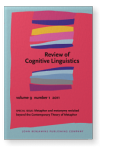Awareness in metaphor understanding
‘The Lingering of the Literal’
This paper argues that a cognitive account of metaphor comprehension needs to include awareness of metaphoricity in order to fully explain the processes involved. In Relevance Theory as well as in other cognitively oriented approaches, much can be gained by making explicit the difference between conscious and subconscious processing: whether a communicator is aware of an expression’s metaphoricity or not may have an impact on the type of cognitive processing involved. A theoretical investigation is offered which explores the potential role of reflective reasoning in metaphor understanding. The discussion is based on the relevance-theoretic account, which explains the subconscious inferential processes involved. However, it leaves open the question of the potential impact of conscious availability of the tension between literal and figurative meaning, which is reminiscent of domain mappings in Cognitive Linguistics. Within metaphor research, a focus on awareness offers valuable findings for cognitively oriented schools of thought.
Cited by (3)
Cited by three other publications
Tseng, Ming-Yu
2024.
What do Chinese bidirectional Life–Xì (‘Drama’) similes/metaphors tell us about metaphorical bidirectionality?.
Lingua 303
► pp. 103714 ff.

Frühbeck Moreno, Carlos
2023.
Pragmática y simbolización.
Revue Romane. Langue et littérature. International Journal of Romance Languages and Literatures 58:2
► pp. 185 ff.

Colston, Herbert L.
2019.
How Language Makes Meaning,

This list is based on CrossRef data as of 16 july 2024. Please note that it may not be complete. Sources presented here have been supplied by the respective publishers.
Any errors therein should be reported to them.
